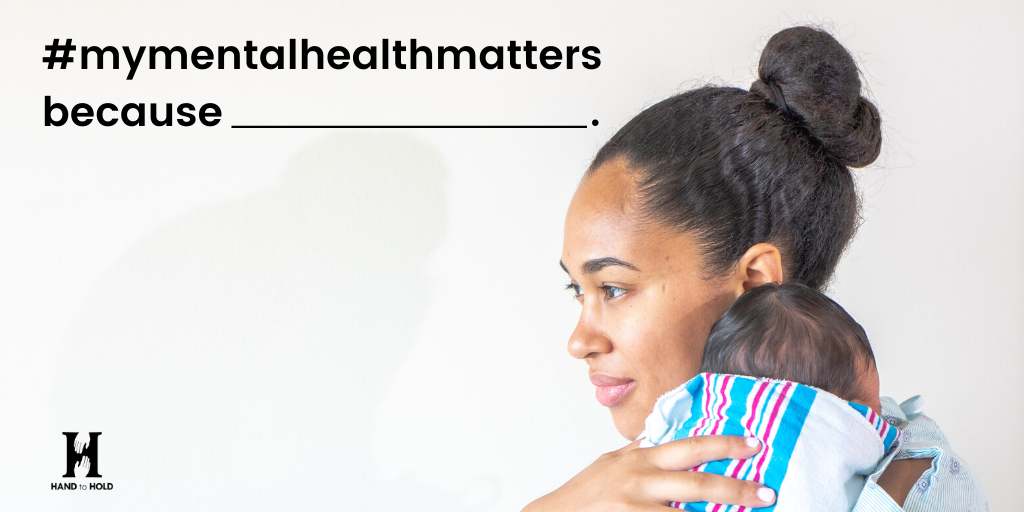
In the days and months after having a baby, our hormones and emotions are still fluctuating. Sometimes these feelings are mild and only last a few days. But sometimes they can be more intense, involve intrusive thoughts, and you may not see a light at the end of the tunnel. There are many perinatal and postpartum mood disorders (PMADs). Here’s how you can determine if you are struggling with something as mild as the baby blues, or if it’s time to seek help from your doctor.
What are PMADs?
Perinatal and postpartum mood disorders are disorders and symptoms that can occur during the pregnancy and postpartum period that interfere with daily life and functioning. PMADs include depression, anxiety, obsessive-compulsive disorder (OCD), bipolar disorder, post-traumatic stress disorder (PTSD) and psychosis. Women from all walks of life experience PMADs, no matter age, race, culture, income level, or any other classification. A study from the CDC shows that nationally, about 1 in 9 women experience symptoms of postpartum depression, with the statistic being as high as 1 in 5 in some states.1
PMADs vs. the baby blues
The baby blues describes a set of emotions that typically set in a few days after the baby is born. Mothers will experience a crash of hormones, resulting in sadness and irritability. The difference is, baby blues lessen over time. “It doesn’t mean you’re still not tired, and it doesn’t mean you may not feel a low level of anxiety,” says Lexi Loesch, Hand to Hold Community Engagement Specialist, “but you feel like you’re managing pretty well.”
Perinatal or postpartum mood and anxiety disorders (PMADs) are depression and anxiety disorders that affect, on average, one in seven new moms (up to 1 in 5 in some states) or even one in ten new dads. PMADs can show up any time during the first year, and sometimes after. Symptoms don’t necessarily have to show up in the first couple months.
These disorders are called “perinatal” to include both the prenatal and the postpartum periods, as some women will experience depression during pregnancy.
LISTEN NOW: PROCESSING EMOTIONS DURING COVID-19
Symptoms of PMADs
With all PMADs parents may experience fatigue. While it’s not unusual to experience fatigue after having a baby, the fatigue that comes with a PMAD lingers. Read on to learn more about more symptoms of various types of PMADs.
Perinatal or postpartum depression (PPD)
Women experiencing depression in pregnancy or in the postnatal period may experience sadness, anger, irritability, guilt or lack of interest in the baby. Feelings of worthlessness or helplessness, difficulty concentrating, and changes in eating and sleeping habits (eating/sleeping more or less than normal) are also common.
Anxiety
Moms suffering from anxiety might experience a constant worry that doesn’t let up, often about their baby’s health and safety. They may experience racing thoughts, disruptions in sleeping and eating habits, and physical symptoms like dizziness and nausea. Some may experience hyper-vigilance, constantly checking on the baby. Some women also experience fear, intrusive thoughts that won’t go away, and shortness of breath or panic attacks.
Obsessive compulsive disorder (OCD)
Mothers with pregnancy or postpartum OCD experience obsessions, also called intrusive thoughts, which are persistent, repetitive thoughts or mental images related to the baby. They may also experience compulsions, doing certain things over and over again to reduce fears and obsessions. This may include things like needing to clean constantly, checking things many times, or counting and reordering things. Moms with postpartum OCD may be afraid to be left with their baby and may experience hyper-vigilance about the baby’s safety. 2
READ NEXT: CARING FOR YOUR MENTAL HEALTH IN THE NICU
Bipolar disorder
According to Postpartum Support International, bipolar disorder in pregnant or postpartum women can look like severe anxiety or depression. Bipolar disorder is characterized by its lows (depression) and highs (mania or hyper-mania). Symptoms include periods of severely depressed mood and irritability, moods much better than normal, rapid speech, little need for sleep, racing thoughts, continuous high energy, and more.3
Post-traumatic stress disorder (PTSD)
Post-traumatic stress disorder (PTSD) is caused by a traumatic event, such as a traumatic birth experience, an emergency delivery or subsequent NICU stay. Many parents with PTSD will find themselves re-experiencing the traumatic birth of their child or a traumatic event in the NICU. Even the beeping of the microwave can be a trigger for some parents, reminding them of the beeping of the NICU machines. Read NICU mom Andrea Mullenmeister’s experience with PTSD.
Psychosis
Postpartum psychosis is rare, occuring in only about 1 or 2 of every 1,000 live births.4 Symptoms include delusions or strange beliefs, hallucinations, paranoia, changes in sleeping patterns, rapid mood swings and more.
Postpartum psychosis is a very serious emergency situation. Moms experiencing these symptoms should receive help right away. Call your doctor or an emergency crisis hotline immediately so that you can get the help you need, or go to the ER.
Get the help you need with PMADs
If you are struggling with any of the above symptoms, you are not alone, and there is help for you. A mental health professional can provide screening options to help you better understand your emotions, physical changes, and needs. It’s important to allow a practitioner to interpret the screening, as they can share the results in a caring and normalizing safe space. Contact your primary care doctor or OBGYN for help with screening for PMADs and finding the support you need.
Other resources:
National Crisis Textline: Text HOME to 741741 from anywhere in the USA, anytime, about any type of crisis. The National Crisis Textline is NOT intended for emergencies and should take the place of talking to your doctor about serious conditions such as psychosis.
National Suicide Prevention Lifeline: 1-800-273-TALK (8255)
Postpartum Support International

Find more resources, information and support at handtohold.org/maternalmentalhealth.
Sources
1 https://www.cdc.gov/reproductivehealth/depression/index.htm
2 https://www.postpartum.net/learn-more/pregnancy-or-postpartum-obsessive-symptoms/
3 https://www.postpartum.net/learn-more/bipolar-mood-disorders/
4 https://www.postpartum.net/learn-more/postpartum-psychosis/
